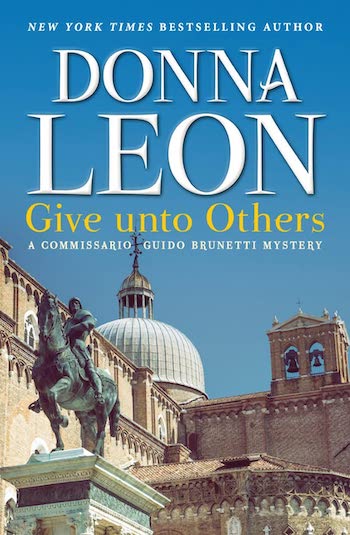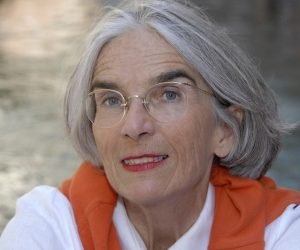Book Review: Donna Leon’s “Give Unto Others” — The Cost We Have All Paid
By Clea Simon
Even as an entry in such an idiosyncratic (and appealing) series, this case is one of the most personal our protagonist — a thoughtful, compassionate man — has faced.
Give Unto Others by Donna Leon. Grove Atlantic, 295 pp, $27.
 Defying crime fiction convention, nobody dies in Donna Leon’s latest mystery, Give Unto Others. In fact, the bloodiest encounter in this, the author’s 31st novel featuring Commissario Guido Brunetti, occurs between two dogs — and by the time we are aware of it, a vet is already on the scene (both animals survive). Humans are injured in the course of Brunetti’s latest case, one seriously. But the true victim of the crime at the center of this book is trust — in those we love and in ourselves as well.
Defying crime fiction convention, nobody dies in Donna Leon’s latest mystery, Give Unto Others. In fact, the bloodiest encounter in this, the author’s 31st novel featuring Commissario Guido Brunetti, occurs between two dogs — and by the time we are aware of it, a vet is already on the scene (both animals survive). Humans are injured in the course of Brunetti’s latest case, one seriously. But the true victim of the crime at the center of this book is trust — in those we love and in ourselves as well.
Perhaps Leon, like most of us, is simply sick of death. Give Unto Others is set in present-day Venice. The pandemic is loosening its hold, but the tourists have not yet returned en masse to Brunetti’s beloved hometown. Characters meet in piazzas or open windows “to allow some air in” when they do gather indoors, and Leon uses the long shadow of Covid-19 to good effect, employing the tension between our new and older habits to establish ambivalence and a lasting sense of dread: “Without thinking, she reached out a hand, perhaps to touch his arm, but pulled it back before contact could be made.… Neither of them spoke.”
Brunetti’s family and colleagues in the Questura — including Claudia Griffoni, Lorenzo Vianello, and the always stunning Elettra Zorzi, among Leon’s usual cast of characters — have all survived, but a pall of grief hangs over this book. Storefronts are empty, the scraps left inside shop windows faded. And while the city once again belongs to its residents, the economic toll of the tourism lost is clear. For Brunetti, a student of history (and amateur classicist), the future is inevitable. Despite legislation passed to prevent the kind of over-tourism that had made his city nearly unlivable, he knows that the cruise ships will return. People never learn.
The relatively bloodless nature of this mystery may also be a natural progression. Leon, who was born in New Jersey and who lived in Italy for many years, has increasingly focused on social issues in her books. Environmental threats, usually voiced by Brunetti’s children, have taken center stage in several of the Brunetti novels, including last year’s Trace Elements, and immigration, as well as abuse and corruption by the government, the medical establishment, and the Catholic church frequently play into his cases. Despite his official title, Brunetti spends as much of his time mulling over these issues as he does official police business, and the usual trappings of police procedurals — whether they be chases or lab work — play a secondary role in these books.
Even as an entry in such an idiosyncratic (and appealing) series, this case is one of the most personal our protagonist — a thoughtful, compassionate man — has faced. Fraud, and the lax Italian laws that accommodate it, may be at the center of this narrative, but the issues at its heart are human rather than legal: loss, aging, and the ways in which time plays on our character, for good or ill.

Author Donna Leon. Photo: Grove Atlantic
The story begins when an old neighbor reappears asking Brunetti for a favor: She would like him to investigate (unofficially), a perceived threat to her adult daughter. Elisabetta Foscarini, the onetime upstairs neighbor, was never a friend — the difference in their age and social class seemed unbridgeable during Brunetti’s childhood. But he remembers the kindness of Foscarini’s mother toward his own, and so he puts aside his professional principles and agrees, eventually involving several of his more trusted colleagues in a case that may have professional, as well as ethical, repercussions for them all.
His investigation leads us into familiar territory: a Venice where the centuries-old aristocracy lives side by side (and often intermarries) with the more lowly populace, and where all must deal with our common contemporary ills and the city’s unique challenges (the acqua alta [high water] siren sounds several times over the course of the book). As in earlier books, series fans will love tracing familiar routes, as Brunetti boards a vaporetto and navigates the city’s maze of walkways and bridges, stunning architecture and decaying palazzos around every turn. This outing, however, is lighter than usual on the domestic scenes — notably the glorious multicourse meals Paola prepares for the family (although there is one risotto with radicchio di Treviso). Surprisingly, this lack doesn’t seriously impair the depiction of Brunetti’s humanity, nor our enjoyment of this latest installment. Perhaps it simply emphasizes how fatigued we have all become. The cost we have all paid.
Clea Simon is the author, most recently, of Hold Me Down. She can be reached at www.CleaSimon.com.
Brookline Booksmith will host Donna Leon in a virtual event for Give unto Others on Saturday, March 26 at 2 p.m. https://www.brooklinebooksmith.com/event/donna-leon-give-unto-others

Hi, Clea: I’m very happy to see you writing for the Fuse: such an eloquent essayist and in your element, weighing in on a contemporary mystery writer more of us should know about. PLEASE, write more!
Thanks! I do write every few months, Gerry! Reviewed Melissa Broder’s Milk Fed most recently.